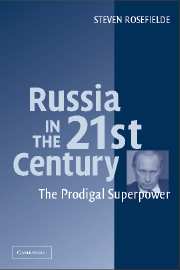Book contents
- Frontmatter
- Contents
- List of Figures and Tables
- List of Acronyms
- Preface
- Acknowledgments
- RUSSIA IN THE 21ST CENTURY
- Introduction
- 1 After “The End of History”
- 2 Prodigal Superpower
- 3 Structural Militarization
- 4 What Could Have Been Done?
- 5 Muscovite Metamorphosis
- 6 Military-Industrial Reform
- 7 National Vulnerabilities
- 8 The Miasma of Global Engagement
- 9 Putin's Choice
- 10 Candor
- Conclusion
- Glossary
- Notes
- Selected Bibliography
- Index
4 - What Could Have Been Done?
Published online by Cambridge University Press: 18 December 2009
- Frontmatter
- Contents
- List of Figures and Tables
- List of Acronyms
- Preface
- Acknowledgments
- RUSSIA IN THE 21ST CENTURY
- Introduction
- 1 After “The End of History”
- 2 Prodigal Superpower
- 3 Structural Militarization
- 4 What Could Have Been Done?
- 5 Muscovite Metamorphosis
- 6 Military-Industrial Reform
- 7 National Vulnerabilities
- 8 The Miasma of Global Engagement
- 9 Putin's Choice
- 10 Candor
- Conclusion
- Glossary
- Notes
- Selected Bibliography
- Index
Summary
POWER AND PROSPERITY
The great irony of Soviet communism was that administrative command planning proved more suitable for weapons production than communalist abundance. Judging by the continuous rise in weapons production during 1985–8 documented by Lee (Fig. 3.3), Gorbachev, like his predecessors, appreciated military power but wanted more options as well, for a variety of contradictory reasons. We know with hindsight (see chaps. 5 and 6) that insofar as he sought to extricate the USSR from structural militarization and westernize it, he failed – that the USSR metamorphosed from a prodigal superpower founded on physical systems management (nonmarket) principles into a structurally militarized mixed economy with perverse Muscovite characteristics. Could this unfortunate outcome have been averted if structural demilitarization and democratic free enterprise had been Gorbachev's highest priorities and he had received better advice? The question is important because it sheds light on the gap between Russian public rhetoric and objective possibilities critical for assessing past actions and future prospects. The answer, which requires a detailed understanding of Soviet institutional realities, is sketched below. It will also serve here as a platform for analyzing what actually transpired later.
The USSR's productive strengths and weaknesses can be traced to its authoritarianism. The Bolsheviks constructed a productive mechanism based primarily on physical systems management principles rather than the “value” principles of markets. This mechanism allowed the state to organize and control factors, output, and distribution without external interference.
- Type
- Chapter
- Information
- Russia in the 21st CenturyThe Prodigal Superpower, pp. 58 - 67Publisher: Cambridge University PressPrint publication year: 2004



